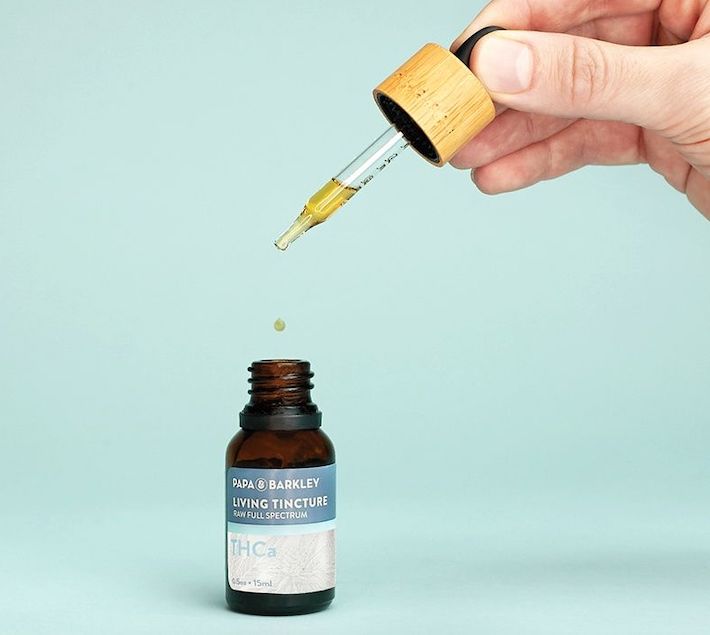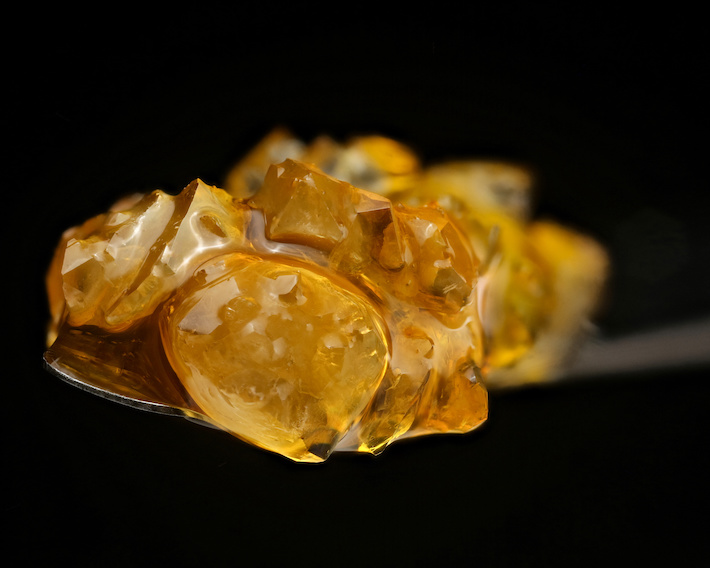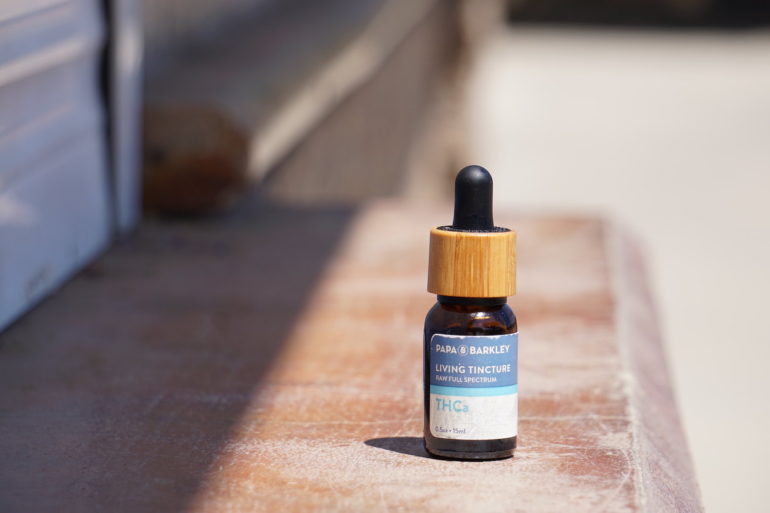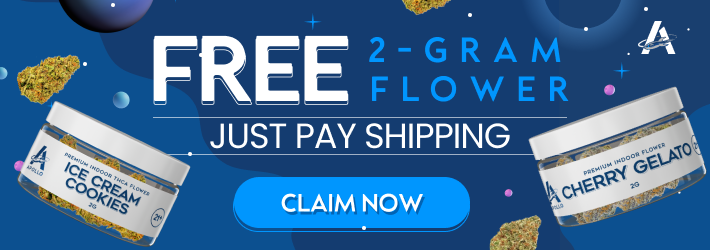THC and THCA may share therapeutic properties for inflammation, metabolic disease, nausea, vomiting, anticancer effects, muscle spasticity, neuroprotection and seizure reduction, and immune-regulation according to preliminary research. THCA consumers can avoid the negative psychoactive effects like cognitive impairment, anxiety, euphoric or dysphoric high, and paranoia that THC can cause.
THCA is available in smokable hemp flower and hemp-based products that are legally available, but with some states restricting access. Cannabis products with >0.3% THC by dry weight remain federally restricted with select states allowing medical or even recreational use.
What Are the Main Differences Between THCA and THC?
The most important difference between THC and THCA is the psychoactive high. THC is well-known to cause an intoxicating high, and many consider this a desirable side effect. It is why cannabis is the most commonly used illegal substance worldwide. However, not everyone likes feeling high or may be very sensitive to THC.
THCA is advantageous in cases where patients are not comfortable with THC impairment but may still benefit from the potential benefits they have in common. This means that older adults or those who simply prefer sobriety may still get lots of the benefits of THC without an undesired high.
Characteristics
- THC and THCA share many therapeutic potentials
- THC is the main psychoactive cannabinoid in Cannabis sativa
- THCA turns into THC under certain temperatures, light, and storage conditions such as smoking, vaping, baking or making edibles, long-term storage, exposure to light and ultraviolet rays
- THCA does not turn into active THC in the body
- THCA’s potential benefits and safety have not been studied as extensively as THC
Sourcing
- In legal states, THC is most often sourced from type I (THC-dominant) cannabis
- 90% of THC is stored as THCA in the trichomes of cannabis plants
- THCA may be gently extracted from raw cannabis or hemp plants (<0.3% THC)
Legality
- THC is federally illegal, however, in some states medical or recreational use is permitted
- THCA present in hemp products with <0.3% delta-9 THC is federally legal
- A handful of states have explicitly prohibited THCA, and some specify that “total THC” (i.e. THC + (0.877 × THCA)) must remain under 0.3% in hemp products
Drug Testing
- Since THCA largely converts into THC with common consumption methods, the use of either one can be detected on routine drug testing which looks for their common THC-COOH metabolite
- THCA itself can be detected in drug screenings
- THCA may be used as a biomarker to tell apart cannabis use (THCA present) from prescription or synthetic THC use (THCA absent)
THCA: Possible Benefits and Side Effects

THCA Benefits
THCA’s benefits may lie somewhere between its precursor, CBGA, and successor, THC. Much of these benefits are based on multiple anti-inflammatory actions, and could potentially be used in:
Reducing inflammation without psychoactivity
- Via gentle activity at CB2, similar to THC
- Contrary to THC, lack of CB1 psychoactivity is another benefit
Cancer
- Similar to CBGA, THCA does not cause a psychoactive high and may confer synergistic anticancer benefits
- In lab tests, THCA may prevent the growth of precancerous colon polyps and human leukemia cancer cell lines when combined with CBGA
IBD
- Anti-inflammatory properties could also be helpful for IBD patients in need of non-intoxicating supplements
- THCA could be better than CBD for IBD based on mice studies.
Neurodegenerative diseases
- Animal studies suggest the potential of THCA for neurodegenerative diseases such as Huntington’s disease
- Early evidence promotes THCA for neuroprotection in critical dopamine neurons and improvements in motor function
Obesity
- Mice fed a high-fat diet with THCA had benefits like less metabolic disease, lower inflammation, improved blood sugar, prevented liver fibrosis
Nausea
- THCA may be an even more potent anti-nausea and anti-emetic cannabinoid than THC
- Mice studies suggest less dosing of THCA is needed than THC for nausea and vomiting
Seizures
- It may be possible to use less THCA than Epidiolex (FDA-approved, pharmaceutical CBD) to help control seizures
- But this is based on much smaller evidence than Epidiolex
- Data may also be confounded by the presence of α-linalool and THC
THCA may also be better absorbed through the skin and into the body than THC. All of these potential benefits, in addition to being non-intoxicating, make THCA advantageous over THC in many situations.
THCA Adverse Effects
Once thought inert, research demonstrates THCA is pharmacologically active. However, cross-contamination with THC and other cannabinoids occurs in real life and in studies.
The only clinical study involving THCA also used other cannabinoids like CBD and THC in different extract ratios. This makes it nearly impossible to document what pure THCA feels like, other than not being psychoactive.
The most common side effects of THCA were mild and infrequent, including:
- Drowsiness (20%)
- Decreased appetite (15%)
- Fatigue (15%)
We can’t fully know all the good or bad of THCA by itself until THCA isolate, THCA-dominant flower, or extract is clinically studied.
Few people have reported getting high from THCA. However, this is more likely due to activating THCA into THC during consumption (heat decarboxylation), or outright THC contamination.
THC: Possible Benefits and Side Effects
THC Benefits
THC is the most well-known and best-studied psychoactive cannabinoid. The scale of THC research to date is enough for it to be pharmaceutically replicated, prescribed, and recommended for many conditions worldwide.
FDA-approved treatments that include THC are for:
- Nausea associated with cancer chemotherapy
- Appetite stimulant for patients with AIDS
- Treatment of neuropathic pain in MS
- Pain relief in patients with advanced cancer
The full set of therapeutic benefits of THC is yet understudied but may extend into symptomatic or other relief in various conditions.
RELATED: THC Benefits and Side Effects
THC Adverse Effects
THC’s most notable side effects are psychoactive. These can be perceived as either beneficial or unwanted depending on the dose, route, and consumer.
Side effects of THC are self-limited and non-serious but may still feel intense, including:
- Euphoria or dysphoria
- Cognitive impairment
- Sedation
- Fast heart rate
- Dry mouth and eyes
Will THC or THCA Show Up on a Drug Test?

Yes, both THC and THCA products and consumption can result in a positive test result for cannabinoids on drug screens.
This is more likely to happen if THCA is consumed in a way that involves heat, causing decarboxylation into THC. THC is metabolized into THC-COOH, the main target of drug testing.
Raw THCA can be detected for around 8 hours after smoking. THCA may be used to differentiate whether the source of THC was prescription or herbal, the latter also positive for THCA.
RELATED: Can You Dispute a Drug Test Result?
Are THC and THCA Legal?
THCA hemp products with less than 0.3% delta-9 THC by dry weight are federally legal. However, many states have restricted THCA products in some way.
Federal law states that hemp must be tested in a way that accounts for the decarboxylation of THCA into THC, and in this sense, THCA would be included in the 0.3% threshold for hemp. However, this USDA rule only applies to pre-harvest hemp, and final products only have to comply with the 0.3% delta-9 THC limit in most cases. Some states (such as Oregon and Florida) apply the “total THC” calculation from federal law to finished products, and in these states, THCA products will usually exceed legal limits.
THC itself is federally illegal, with some states allowing exceptions and regulating state-legal cannabis markets.
Always double-check your local laws before buying, consuming, or transporting cannabinoids.
Conclusion: THC vs THCA
Deciding between taking THC or THCA comes down to legality and psychoactivity. Patients without legal access to THC may partake of THCA hemp and products that can offer similar benefits.
THCA is largely advantageous to consumers who wish to remain sober and still enjoy life while reaping most of the benefits of THC.
Editor’s note: We added clarifying details on July 27, 2023, to explain our interpretation of regulations for THCA products.
References (16)
- National Academies of Sciences, E., Division, H. and M., Practice, B. on P. H. and P. H., & Agenda, C. on the H. E. of M. A. E. R. and R. (2017). Therapeutic Effects of Cannabis and Cannabinoids. In The Health Effects of Cannabis and Cannabinoids: The Current State of Evidence and Recommendations for Research. National Academies Press (US). https://www.ncbi.nlm.nih.gov/books/NBK425767/
- Hannon, M. B., Deabold, K. A., Talsma, B. N., Lyubimov, A., Iqbal, A., Zakharov, A., Gamble, L. J., & Wakshlag, J. J. (2020). Serum cannabidiol, tetrahydrocannabinol (THC), and their native acid derivatives after transdermal application of a low-THC Cannabis sativa extract in beagles. Journal of Veterinary Pharmacology and Therapeutics, 43(5), 508–511. https://doi.org/10.1111/jvp.12896
- Nallathambi, R., Mazuz, M., Ion, A., Selvaraj, G., Weininger, S., Fridlender, M., Nasser, A., Sagee, O., Kumari, P., Nemichenizer, D., Mendelovitz, M., Firstein, N., Hanin, O., Konikoff, F., Kapulnik, Y., Naftali, T., & Koltai, H. (2017). Anti-Inflammatory Activity in Colon Models Is Derived from Δ9-Tetrahydrocannabinolic Acid That Interacts with Additional Compounds in Cannabis Extracts. Cannabis and Cannabinoid Research, 2(1), 167–182. https://doi.org/10.1089/can.2017.0027
- Rock, E. M., Sullivan, M. T., Pravato, S., Pratt, M., Limebeer, C. L., & Parker, L. A. (2020). Effect of combined doses of Δ9-tetrahydrocannabinol and cannabidiol or tetrahydrocannabinolic acid and cannabidiolic acid on acute nausea in male Sprague-Dawley rats. Psychopharmacology, 237(3), 901–914. https://doi.org/10.1007/s00213-019-05428-4
- Moldzio, R., Pacher, T., Krewenka, C., Kranner, B., Novak, J., Duvigneau, J. C., & Rausch, W.-D. (2012). Effects of cannabinoids Δ(9)-tetrahydrocannabinol, Δ(9)-tetrahydrocannabinolic acid and cannabidiol in MPP+ affected murine mesencephalic cultures. Phytomedicine: International Journal of Phytotherapy and Phytopharmacology, 19(8–9), 819–824. https://doi.org/10.1016/j.phymed.2012.04.002
- Palomares, B., Ruiz-Pino, F., Garrido-Rodriguez, M., Eugenia Prados, M., Sánchez-Garrido, M. A., Velasco, I., Vazquez, M. J., Nadal, X., Ferreiro-Vera, C., Morrugares, R., Appendino, G., Calzado, M. A., Tena-Sempere, M., & Muñoz, E. (2020). Tetrahydrocannabinolic acid A (THCA-A) reduces adiposity and prevents metabolic disease caused by diet-induced obesity. Biochemical Pharmacology, 171, 113693. https://doi.org/10.1016/j.bcp.2019.113693
- Nadal, X., del Río, C., Casano, S., Palomares, B., Ferreiro‐Vera, C., Navarrete, C., Sánchez‐Carnerero, C., Cantarero, I., Bellido, M. L., Meyer, S., Morello, G., Appendino, G., & Muñoz, E. (2017). Tetrahydrocannabinolic acid is a potent PPARγ agonist with neuroprotective activity. British Journal of Pharmacology, 174(23), 4263–4276. https://doi.org/10.1111/bph.14019
- Walsh, K. B., McKinney, A. E., & Holmes, A. E. (2021). Minor Cannabinoids: Biosynthesis, Molecular Pharmacology and Potential Therapeutic Uses. Frontiers in Pharmacology, 12, 777804. https://doi.org/10.3389/fphar.2021.777804
- Rock, E. M., Kopstick, R. L., Limebeer, C. L., & Parker, L. A. (2013). Tetrahydrocannabinolic acid reduces nausea-induced conditioned gaping in rats and vomiting in Suncus murinus. British Journal of Pharmacology, 170(3), 641–648. https://doi.org/10.1111/bph.12316
- Verhoeckx, K. C. M., Korthout, H. A. A. J., van Meeteren-Kreikamp, A. P., Ehlert, K. A., Wang, M., van der Greef, J., Rodenburg, R. J. T., & Witkamp, R. F. (2006). Unheated Cannabis sativa extracts and its major compound THC-acid have potential immuno-modulating properties not mediated by CB1 and CB2 receptor coupled pathways. International Immunopharmacology, 6(4), 656–665. https://doi.org/10.1016/j.intimp.2005.10.002
- Geci, M., Scialdone, M., & Tishler, J. (2023). The Dark Side of Cannabidiol: The Unanticipated Social and Clinical Implications of Synthetic Δ8-THC. Cannabis and Cannabinoid Research, 8(2), 270–282. https://doi.org/10.1089/can.2022.0126
- Filer, C. N. (2023). Delta-9-Tetrahydrocannabinolic Acid B: A Mechanism for its Formation in Cannabis. Cannabis and Cannabinoid Research, 8(1), 1–4. https://doi.org/10.1089/can.2021.0216
- Filer, C. N. (2022). Acidic Cannabinoid Decarboxylation. Cannabis and Cannabinoid Research, 7(3), 262–273. https://doi.org/10.1089/can.2021.0072
- Moreno-Sanz, G. (2016). Can You Pass the Acid Test? Critical Review and Novel Therapeutic Perspectives of Δ9-Tetrahydrocannabinolic Acid A. Cannabis and Cannabinoid Research, 1(1), 124–130. https://doi.org/10.1089/can.2016.0008
- Ebbert, J. O., Scharf, E. L., & Hurt, R. T. (2018). Medical Cannabis. Mayo Clinic Proceedings, 93(12), 1842–1847. https://doi.org/10.1016/j.mayocp.2018.09.005
- Sulak, D., Saneto, R., & Goldstein, B. (2017). The current status of artisanal cannabis for the treatment of epilepsy in the United States. Epilepsy & Behavior: E&B, 70(Pt B), 328–333. https://doi.org/10.1016/j.yebeh.2016.12.032

